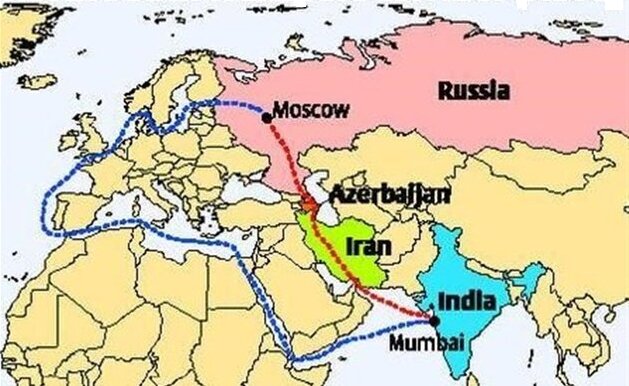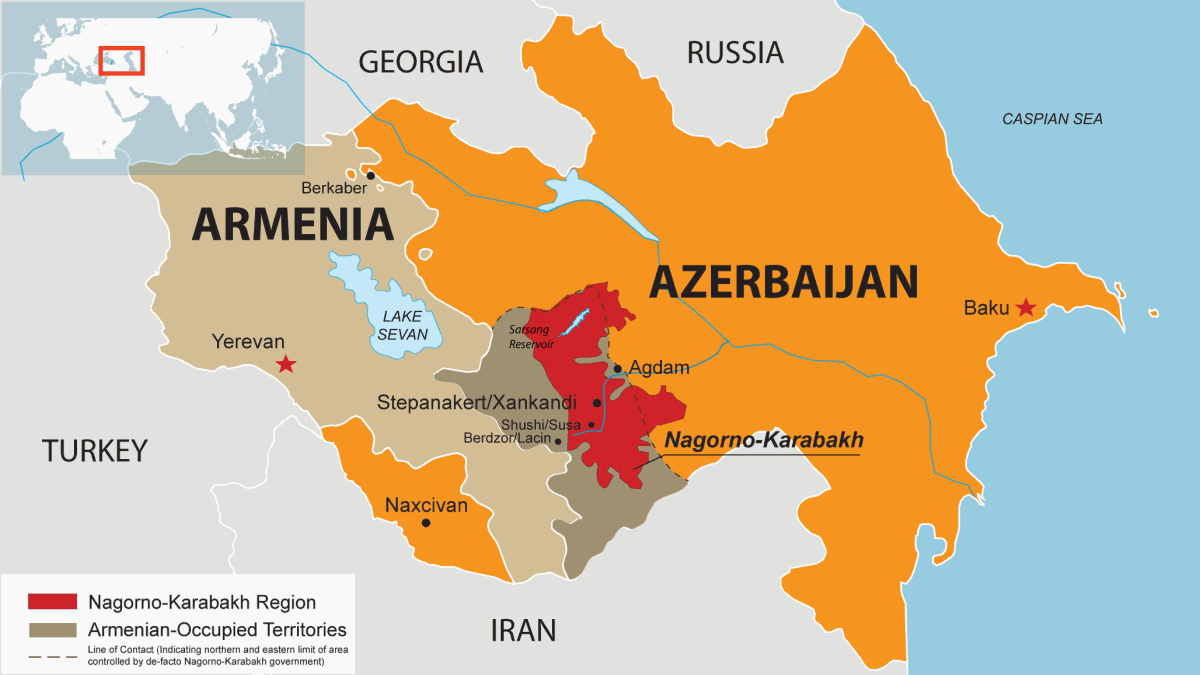International Relations
Armenia-Azerbaijan Conflict
- 28 Sep 2020
- 7 min read
Why in News
Recently, territorial dispute between Armenia and Azerbaijan over the Nagorno-Karabakh region has re-erupted with heavy clashes.
- Armenia and Azerbaijan are part of Transcaucasia or South Caucasia (geographical region in the vicinity of the southern Caucasus Mountains on the border of Eastern Europe and Western Asia consisting of Georgia, Armenia, and Azerbaijan).
Key Points
- Reasons for Dispute:
- Territorial: Nagorno-Karabakh region has 95% of the population as ethnically Armenian and is controlled by them but it is internationally recognised as part of Azerbaijan.
- Religious: Armenia is Christian majority, while Azerbaijan is Muslim majority country.
- Domestic Politics: The leaders of both the nations have fueled the issue time and again for their vested political interests.
- History of Dispute:
- 1920: Nagorno-Karabakh Autonomous Region was established within Azerbaijan by the then Soviet Union.
- 1988: Nagorno-Karabakh legislature passed a resolution to join Armenia despite the region's legal location within Azerbaijan’s borders.
- 1991 : The autonomous region officially declared that it would not join either of the countries after a referendum which was boycotted by Azerbaijan. War erupted between Armenia and Azerbaijan over the region, leaving roughly tens of thousands of casualties and hundreds of thousands of refugees.
- 1994: Russia mediated a cease-fire which has remained in place since.
- 2016: In April 2016, the region was particularly tense because of violent fighting between the two countries, which was known as the Four Day War.
- Apart from this, intermittent ceasefire violations between Azerbaijani and Armenian troops have caused hundreds of deaths in the past decade.
- Impact:
- Destabilize the Region: Renewed tensions threaten to reignite a military conflict between the countries and destabilize the South Caucasus region. This may cause social unrest in the region which is already suffering from the Covid-19 pandemic.
- Civilian Casualties: In this disputed region, there are hundreds of civilian settlements, residents of which would be directly impacted and potentially displaced if any large-scale war were to break out between the two countries
- Economic Impact: This could also disrupt oil and gas exports from the region, since Azerbaijan, is a significant oil and gas exporter to Europe and Central Asia. This may even lead to higher oil prices globally.
- International Involvement: Russia has closer ties with Armenia while Turkey and USA support Azerbaijan, and Iran has a large Azeri minority, which could escalate a crisis and entangle actors involved. Any military escalation would draw regional powers like Turkey and Russia more deeply into the conflict.
- Russia, Israel and many other countries have been supplying Arms to both the countries despite the arms embargo by the United Nations.
Effect on India
- India- Armenia: In recent years, Indian-Armenian bilateral cooperation has seen rapid growth.
- The then Vice-President of India visited Yerevan (Armenia) in 2017.
- Armenia bought the India SWATHI military radar system in March 2020.
- Many Indian students study in Armenian medical Universities and in recent years Armenia has witnessed an increasing flow of Indian labour migrants.
- For Armenia, close relations with India are vitally important as India provides a counter balance to the rival strategic axis between Azerbaijan, Pakistan and Turkey.
- India-Azerbaijan: India is part of the International North–South Transport Corridor (INSTC), a multimodal network of ship, rail, and road route for moving freight between India, Iran, Afghanistan, Azerbaijan, Russia, Central Asia and Europe.

- Azerbaijan is a dialogue partner of Shanghai Cooperation Organisation (SCO), which India is a member of.
- In 2018, the then Indian External affairs minister had visited Baku (Azerbaijan), the first-ever bilateral visit of an Indian External Affairs Minister to Azerbaijan.
- India’s ONGC-Videsh is an investor in Azeri-Chirag-Gunashli (ACG) oil fields and Baku-Tbilisi-Ceyhan pipeline.
- However, Azerbaijan supports Pakistan’s position on the Kashmir issue.
- Pakistan Angle:
- India has supported Armenia while Azerbaijan has been supported by Pakistan. Pakistan was the second country to recognize Azerbaijan’s independence after Turkey. Also, Pakistan is the only country that does not recognize Armenia as an independent state and fully supports Azerbaijan’s position.
- China Angle:
- China has grown increasingly active in the caucasian region, conducting a number of programs and signing economic, political and military agreements with Armenia. Armenia has also agreed to participate in the Chinese Belt and Road project.
- However, China is an ally of its rival Azerbaijan and Armenia is also aware of its support to Pakistan.
Way Forward
- The conflict between the two countries has reached alarming levels and the international mediators should intervene immediately and push sides for substantive negotiations to prevent any further escalations.
- Growing Pakistan- China-Turkey’s influence in the south caucasus region is a source of concern for India. It is important for it to strengthen its ties with both the countries in line continuing its non-aligned stance, and call for peace in the region.





